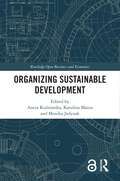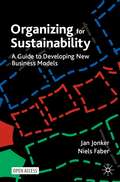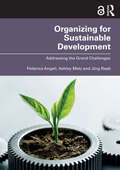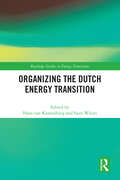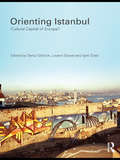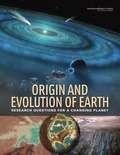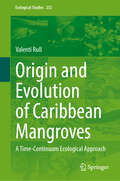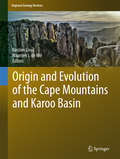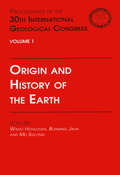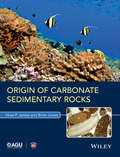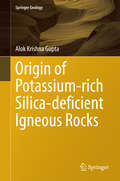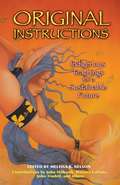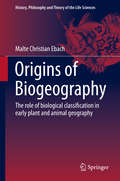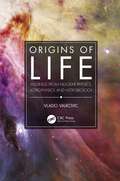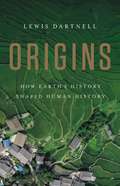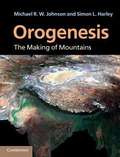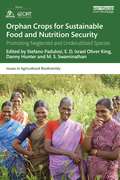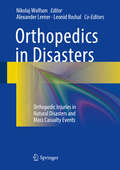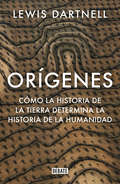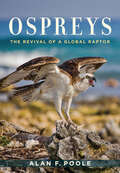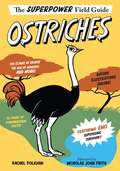- Table View
- List View
Organizing Sustainable Development (Routledge Open Business and Economics)
by Aneta Kuźniarska Karolina Mania Monika JedynakThe role and meaning of sustainable development have been recognized in the scientific literature for decades. However, there has recently been a dynamic increase in interest in the subject, which results in numerous, in-depth scientific research and publications with an interdisciplinary dimension. This edited volume is a compendium of theoretical knowledge on sustainable development. The context analysed in the publication includes a multi-level and multi-aspect analysis starting from the historical and legal conditions, through elements of the macro level and the micro level, inside the organization. Organizing Sustainable Development offers a systematic and comprehensive theoretical analysis of sustainable development supplemented with practical examples, which will allow obtaining comprehensive knowledge about the meaning and its multi-context application in practice. It shows the latest state of knowledge on the topic and will be of interest to students at an advanced level, academics and reflective practitioners in the fields of sustainable development, management studies, organizational studies and corporate social responsibility.
Organizing for Sustainability: A Guide to Developing New Business Models
by Jan Jonker Niels FaberThis upper-level Open Access textbook aims to educate students and professionals on how to develop business models that have a positive impact on people, society, and the social and ecological environment. It explores a different view of how to organize value creation, from a focus on an almost exclusively monetary value creation to one that creates positive impact through multiple values. The book offers students and entrepreneurs a structured approach based through the Business Model Template (BMT). It consists of three stages and ten building blocks to facilitate the development of a business model. Users, be they students or practitioners, need to choose from one of the three offered business model archetypes, namely the platform, community, or circular business models. Each archetype offers a dedicated logic for vale creation. The book can be used to develop a business model from scratch (turning an idea into a working prototype) or to transform an existing business model into one of the three archetypes. Throughout the book extra sources, links to relevant online video clips, assignments and literature are offered to facilitate the development process. This book will be of interest to students studying the development of business models, sustainable management, innovation, and value creation. It will also be of interest executives, and professionals such as consultants or social entrepreneurs seeking further education.
Organizing for Sustainable Development: Addressing the Grand Challenges
by Federica Angeli Ashley Metz Jörg RaabThe Sustainable Development Goals (SDGs) recognize the increasingly complex, interdependent nature of societal and environmental issues for governments and business. Tackling such "grand challenges" requires the concerted action of a multitude of organizations and multiple stakeholders at different levels in the public, private, and non-profit sector. Organizing for Sustainable Development provides an integrated and comparative overview of the successes and failures of organizational efforts to tackle global societal issues and achieve sustainable development. Summarizing years of study by an interdisciplinary board of authors and contributors, this book provides readers with an in-depth understanding of how existing businesses and new hybrid organizations can achieve sustainable development to bring about an improved society, marking a key contribution to the literature in this field. Combining theoretical views with empirical approaches, the chapters in this book are highly relevant to graduate and undergraduate (multidisciplinary) programs in sustainable development, organization studies, development economics, development studies, international management, and social entrepreneurship.
Organizing for Sustainable Development: Addressing the Grand Challenges
by Federica Angeli Ashley Metz Jörg RaabThe Sustainable Development Goals (SDGs) recognize the increasingly complex, interdependent nature of societal and environmental issues for governments and business. Tackling such "grand challenges" requires the concerted action of a multitude of organizations and multiple stakeholders at different levels in the public, private, and non-profit sector.Organizing for Sustainable Development provides an integrated and comparative overview of the successes and failures of organizational efforts to tackle global societal issues and achieve sustainable development. Summarizing years of study by an interdisciplinary board of authors and contributors, this book provides readers with an in-depth understanding of how existing businesses and new hybrid organizations can achieve sustainable development to bring about an improved society, marking a key contribution to the literature in this field.Combining theoretical views with empirical approaches, the chapters in this book are highly relevant to graduate and undergraduate (multidisciplinary) programs in sustainable development, organization studies, development economics, development studies, international management, and social entrepreneurship.The Open Access version of this book, available at www.taylorfrancis.com, has been made available under a Creative Commons Attribution-NonCommercial (CC-BY) 4.0 license.
Organizing the Dutch Energy Transition (Routledge Studies in Energy Transitions)
by Hans Van Kranenburg Sjors WitjesThis book addresses learnings from the energy transition in the Netherlands.This book brings together contributions from experts in academia and practice to the Dutch energy transition by sharing their knowledge and experience gained over many years and from different roles and responsibilities. The chapters are clustered around four key perspectives – Policy, Sector, Organization, and Future – and explore the impact of policy decisions of governments and strategic decisions of firms operating in the energy sector on the energy transition process. The different perspectives present many promising strategies, policies, and innovations on each aspect, resulting in a deeper understanding of how each of these strategies, policies, and innovations may hinder or contribute to foster the energy transition. It concludes with a reflection on lessons learned and specific managerial and policy recommendations.This volume will be of great interest to students, scholars, and industry professionals researching and working in the areas of energy transitions, sustainable business, energy technology, and energy policy.
Organometallic Magnets (Topics in Organometallic Chemistry #64)
by Vadapalli Chandrasekhar Fabrice PointillartThis volume highlights the recent advances and state of art in the experimental and theoretical studies of organometallic magnets. A plethora of organic ligands such as Mannich-base derivatives, redox-active chromophores, cyanides, Schiff base among others are used to coordinate to 3d transition metals, 4f lanthanides and 5f actinides to design the molecular magnets. Deep analysis of the coordination sphere symmetry, electronic distribution, luminescence are investigated to perform magneto-structural correlation leading to a better understanding of the magnetic properties. Furthermore, the rationalization of the magnetic behavior can be reached using ab initio calculations. The multiple applications that these molecular magnets offer could revolutionize the high-density data storage, spintronics and quantum computing technologies. This volume provides a discussion of these topics from leading international experts and will be a useful reference for researchers working in this field.
Orienting Istanbul: Cultural Capital of Europe? (Planning, History and Environment Series)
by Deniz GöktürkLooking at the globalization, urban regeneration, arts events and cultural spectacles, this book considers a city not until now included in the global city debate. Divided into five parts, each preceded by an editorial introduction, this book is an interdisciplinary study of an iconic city, a city facing conflicting social, political and cultural pressures in its search for a place in Europe and on the world stage in the twenty-first century.
Origin And Evolution Of Earth: Research Questions For A Changing Planet
by National Research Council of the National AcademiesQuestions about the origin and nature of Earth and the life on it have long preoccupied human thought and the scientific endeavor. Deciphering the planet's history and processes could improve the ability to predict catastrophes like earthquakes and volcanic eruptions, to manage Earth's resources, and to anticipate changes in climate and geologic processes. At the request of the U.S. Department of Energy, National Aeronautics and Space Administration, National Science Foundation, and U.S. Geological Survey, the National Research Council assembled a committee to propose and explore grand questions in geological and planetary science. This book captures, in a series of questions, the essential scientific challenges that constitute the frontier of Earth science at the start of the 21st century.
Origin and Evolution of Caribbean Mangroves: A Time-Continuum Ecological Approach (Ecological Studies #252)
by Valentí RullThis book provides a comprehensive, detailed, and coherent spatio-temporal account of Caribbean mangrove evolution from its evolutionary origins to the present that is not available for any mangrove region in the world. Mangroves are intertidal wetland forests that play a crucial role in the maintenance of terrestrial and marine biodiversity, and in the functioning of global biogeochemical cycles (especially the carbon cycle). These ecosystems dominate the tropical/subtropical coasts of all continents and are among the most threatened ecosystems in the world. This book combines all temporal scales, from the geological to the ecological, to provide an integrated picture of mangrove history and the natural and anthropogenic drivers of ecological and evolutionary change. This may be useful not only for understanding the current ecological status of these emblematic ecosystems, but also for informing their conservation in the face of ongoing global change.
Origin and Evolution of the Cape Mountains and Karoo Basin
by Maarten J. de Wit Bastien LinolThis book describes the latest research on the geological, geochemical, geochronological, biological, and geomorphic evolution of the unique and relatively pristine landscape of the Cape Mountains and the Karoo Basin, a region in South Africa that is currently being targeted for shale gas exploration and development. With up-to-date graphics, maps, drill-core and seismic data, it offers the latest observations and synthesis, and highlights areas of ongoing research. The work presented also considers a wider connection of the Cape-Karoo system to other basins in Central Gondwana, including South America, thus following in the footsteps of A. L. du Toit. Clearly, there is still much to be learned before shale gas development can be considered, and this book provides some timely perspectives.
Origin and History of the Earth: Proceedings of the 30th International Geological Congress, Volume 1
by WANG HONGZHEN, BORMING JAHN AND MEI SHILONGThis book deals with the different aspects of the symposia, ranging from, in the original order of the sessions, early history of the earth, continental accretion, coremantle differentiation, biological evolution, palaeoclimate, to interaction between the lithosphere and the hydro-atmo-biosphere.
Origin of Carbonate Sedimentary Rocks
by Brian Jones Noel P. JamesThis textbook provides an overview of the origin and preservation of carbonate sedimentary rocks. The focus is on limestones and dolostones and the sediments from which they are derived. The approach is general and universal and draws heavily on fundamental discoveries, arresting interpretations, and keystone syntheses that have been developed over the last five decades. The book is designed as a teaching tool for upper level undergraduate classes, a fundamental reference for graduate and research students, and a scholarly source of information for practicing professionals whose expertise lies outside this specialty. The approach is rigorous, with every chapter being designed as a separate lecture on a specific topic that is encased within a larger scheme. The text is profusely illustrated with all colour diagrams and images of rocks, subsurface cores, thin sections, modern sediments, and underwater seascapes.Additional resources for this book can be found at: www.wiley.com/go/james/carbonaterocks
Origin of Potassium-rich Silica-deficient Igneous Rocks
by Alok Krishna GuptaThe book summarizes the occurrence, geochemistry, mineralogy, petrology and phase-equilibria studies in air and under high pressures related to the most intriguing group of potassium-rich mafic and ultramafic rocks, often including host of exotic mineral assemblages including feldspathoids. Mantle-derived K-rich melts had intrigued most of the founders of Geology and many of the later experts in the field of Igneous Petrology, because they are sometimes associated with carbonatites and even diamond. They tend to contain anomalous concentration of many such elements as K, Rb, Sr, U, F, P, etc. , along with Ni, Co and Cr indicating a mixture of crust and mantle materials. Although these rocks occur rarely in ancient geologic time, they have been erupting mostly in modern geological history (less than last 120 Ma or so). Are the old age data real or the result of a sampling problem? Modern observations leave no doubt that sediments must be subducted on a large scale. There is now evidence that the upper mantle (and perhaps even the lower mantle) is not homogeneous but rather like a fruit cake, and that there are thermal anomalies in the mantle resulting from deep mantle plumes or subduction. Is this related to release of these unusual rocks clearing the mantle of left over subduction materials? This volume, written for those interested in the geochemistry of K-rich melts from the deep Earth, reviews the present state of knowledge of these unique igneous rocks. The author is an expert in the field of Igneous Petrology and the book will serve as a valuable reference book for researchers and academicians in the discipline.
Origin of Potassium-rich Silica-deficient Igneous Rocks (Springer Geology)
by Alok Krishna GuptaThe book summarizes the occurrence, geochemistry, mineralogy, petrology and phase-equilibria studies in air and under high pressures related to the most intriguing group of potassium-rich mafic and ultramafic rocks, often including host of exotic mineral assemblages including feldspathoids. Mantle-derived K-rich melts had intrigued most of the founders of Geology and many of the later experts in the field of Igneous Petrology, because they are sometimes associated with carbonatites and even diamond. They tend to contain anomalous concentration of many such elements as K, Rb, Sr, U, F, P, etc., along with Ni, Co and Cr indicating a mixture of crust and mantle materials. Although these rocks occur rarely in ancient geologic time, they have been erupting mostly in modern geological history (less than last 120 Ma or so). Are the old age data real or the result of a sampling problem? Modern observations leave no doubt that sediments must be subducted on a large scale. There is now evidence that the upper mantle (and perhaps even the lower mantle) is not homogeneous but rather like a fruit cake, and that there are thermal anomalies in the mantle resulting from deep mantle plumes or subduction. Is this related to release of these unusual rocks clearing the mantle of left over subduction materials? This volume, written for those interested in the geochemistry of K-rich melts from the deep Earth, reviews the present state of knowledge of these unique igneous rocks. The author is an expert in the field of Igneous Petrology and the book will serve as a valuable reference book for researchers and academicians in the discipline.
Original Instructions: Indigenous Teachings for a Sustainable Future
by Melissa K. NelsonIndigenous leaders and other visionaries suggest solutions to today’s global crisis • Original Instructions are ancient ways of living from the heart of humanity within the heart of nature • Explores the convergence of indigenous and contemporary science and the re-indigenization of the world’s peoples • Includes authoritative indigenous voices, including John Mohawk and Winona LaDukeFor millennia the world’s indigenous peoples have acted as guardians of the web of life for the next seven generations. They’ve successfully managed complex reciprocal relationships between biological and cultural diversity. Awareness of indigenous knowledge is reemerging at the eleventh hour to help avert global ecological and social collapse. Indigenous cultural wisdom shows us how to live in peace--with the earth and one another.Original Instructions evokes the rich indigenous storytelling tradition in this collection of presentations gathered from the annual Bioneers conference. It depicts how the world’s native leaders and scholars are safeguarding the original instructions, reminding us about gratitude, kinship, and a reverence for community and creation. Included are more than 20 contemporary indigenous leaders--such as Chief Oren Lyons, John Mohawk, Winona LaDuke, and John Trudell. These beautiful, wise voices remind us where hope lies.
Origins of Biogeography
by Malte Christian EbachThis book presents a revised history of early biogeography and investigates the split in taxonomic practice, between the classification of taxa and the classification of vegetation. It moves beyond the traditional belief that biogeography is born from a synthesis of Darwin and Wallace and focuses on the important pioneering work of earlier practitioners such as Zimmermann, Stromeyer, de Candolle and Humboldt. Tracing the academic history of biogeography over the decades and centuries, this book recounts the early schisms in phyto and zoogeography, the shedding of its bonds to taxonomy, its adoption of an ecological framework and its beginnings at the dawn of the 20th century. This book assesses the contributions of key figures such as Zimmermann, Humboldt and Wallace and reminds us of the forgotten influence of plant and animal geographers including Stromeyer, Prichard and de Candolle, whose early attempts at classifying animal and plant geography would inform later progress. The Origins of Biogeography is a science historiography aimed at biogeographers, who have little access to a detailed history of the practices of early plant and animal geographers. This book will also reveal how biological classification has shaped 18th and 19th century plant and animal geography and why it is relevant to the 21st bio geographer.
Origins of Life: Musings from Nuclear Physics, Astrophysics and Astrobiology
by Vlado ValkovicThe primary purpose of this book is to prepare the ground for coordinated efforts aiming to answer the question: where and when life originated. The appearance of life involves three successive stages: i) the formation of chemical elements and their combination to simple molecules, which is the concern of physicists; ii) the evolution of organized complexity in biomolecules and their reactions, which falls within the field of chemistry; iii) the onset of Darwinian evolution after the appearance of the first cell-like structure, which is studied by biologists. This book focuses on the first two steps of this process with chapters exploring topics such as chemical element abundances; galaxies, galactic magnetic fields and cosmic rays; galactic chemical evolution. Key Features: Contains extensive lists of reference and additional reading. Includes new hypotheses concerning the origin of life. Combines consideration from nuclear physics, astrophysics, astro- and geochemistry. Despite its interdisciplinary nature, this book remains accessible to nonexperts, and would be a valuable companion for both experts and laypeople.
Origins: How Earth's History Shaped Human History
by Lewis DartnellA New York Times-bestselling author explains how the physical world shaped the history of our speciesWhen we talk about human history, we often focus on great leaders, population forces, and decisive wars. But how has the earth itself determined our destiny? Our planet wobbles, driving changes in climate that forced the transition from nomadism to farming. Mountainous terrain led to the development of democracy in Greece. Atmospheric circulation patterns later on shaped the progression of global exploration, colonization, and trade. Even today, voting behavior in the south-east United States ultimately follows the underlying pattern of 75 million-year-old sediments from an ancient sea. Everywhere is the deep imprint of the planetary on the human. From the cultivation of the first crops to the founding of modern states, Origins reveals the breathtaking impact of the earth beneath our feet on the shape of our human civilizations.
Orogenesis: The Making of Mountains
by Michael R. Johnson Simon L. HarleyOrogenesis, the process of mountain building, occurs when two tectonic plates collide - either forcing material upwards to form mountain belts such as the Alps or Himalayas or causing one plate to be subducted below the other, resulting in volcanic mountain chains such as the Andes. Integrating the approaches of structural geology and metamorphism, this book provides an up-to-date overview of orogenic research and an introduction to the physico-chemical properties of mountain belts. Global examples are explored, the interactioning roles of temperature and deformation in the orogenic process are reviewed, and important new concepts such as channel flow are explained. This book provides a valuable introduction to this fast-moving field for advanced undergraduate and graduate students of structural geology, plate tectonics and geodynamics, and will also provide a vital overview of research for academics and researchers working in related fields including petrology geochemistry and sedimentology.
Orogenic-Type Polymetallic Mineralization Associated with Multistage Orogenesis in Northern North China Plate
by Wenbo Li Richen Zhong Yanjing Chen Qiaohui PiThis book focuses on the geological characteristics and genesis of several base metal deposits in the northern margin of the North China Plate, namely the Bainaimiao Cu-Au-Mo, the Huogeqi Cu-Pb-Zn, the Dongshengmiao Zn-Pb-Cu and the Jiashengpan Zn-Pb deposits. These deposits have geological and geochemical affinities with orogenic-type deposits, such as shear zone-controlled mineralization and carbon-rich low-salinitiy ore-forming fluids, and are characterized by multistage ore-forming histories. Remobilization of the pre-enriched (stratabound or porphyry-type) base metals took place as responses to orogenesis and metamorphism, leading to metal redistribution and the formation of orogenic-type orebodies. The formation of orogenic-type base metal deposits is enigmatic, and the case studies presented in this book provide insights into understanding the genesis of this type of deposits. In particular, pre-enrichment of base metals seems to be important, in terms of preconditioning for later shear zone-controlled mineralization, since base metals are believed to have limited solubilities in the low-salinity ore-fluids.
Orphan Crops for Sustainable Food and Nutrition Security: Promoting Neglected and Underutilized Species (Issues in Agricultural Biodiversity)
by Danny Hunter Stefano Padulosi E.D. Israel Oliver King M. S. SwaminathanOrphan Crops for Sustainable Food and Nutrition Security discusses the issues, challenges, needs and opportunities related to the promotion of orphan crops, known also as neglected and underutilized species (NUS). The book is structured into six parts, covering the following themes: introduction to NUS, approaches, methods and tools for the use enhancement of NUS, integrated conservation and use of minor millets, nutritional and food security roles of minor millets, stakeholders and global champions, and, building an enabling environment. Presenting a number of case studies at the regional and country levels, the chapters cover different but highly interlinked aspects along the value chains, from acquisition and characterization of genetic diversity, cultivation and harvesting to value addition, marketing, consumption and policy for mainstreaming. Cross-cutting issues like gender, capacity building and empowerment of vulnerable groups are also addressed by authors. Representatives from communities, research for development agencies and the private sector also share their reflections on the needs for the use enhancement of NUS from their own perspectives. This book will be of great interest to students and scholars of food security, sustainable agriculture, nutrition and health and development, as well as practitioners and policymakers involved in building more resilient food and production systems.
Orthopedics in Disasters
by Nikolaj Wolfson Alexander Lerner Leonid RoshalThis book is the first to address specifically the mechanisms and treatment of orthopedic injuries due to natural disasters and other mass casualty events. Casualty management is discussed in a range of contexts, from earthquakes and tsunamis to terror attacks and combat situations. Organizational aspects are addressed, general treatment principles are documented, and the management of a variety of orthopedic injuries is described with the aid of numerous illustrations. The book will serve as an invaluable source of practical knowledge for a broad spectrum of medical and other staff, including emergency personnel, orthopedic and trauma surgeons, general practitioners, medical students, and professionals working for the military, government bodies, and NGOs.
Orígenes: Cómo la historia de la Tierra determina la historia de la humanidad
by Lewis Dartnell¿Por qué? ¿Pero por qué? ¿Y por qué? La historia humana como nunca antes te la habían contado. Cuando se habla de algo tan inabarcable como la historia de la humanidad solemos poner el foco en cosas muy concretas. Nos gusta enumerar los líderes que marcaron la diferencia, señalar ciertos fenómenos como la migración o describir las consecuencias de las guerras más decisivas. Pero, ¿qué pasaría si cambiáramos el enfoque y pusiéramos a la Tierra en el centro de nuestras averiguaciones? Este libro es lo que pasaría. Para Lewis Dartnell la única manera de comprender nuestra historia consiste en explicar cómo nuestro planeta, desde el inicio de los tiempos, ha determinado nuestro destino. Toda especie está condicionada por su entorno. Es algo ineludible: las fuerzas geológicas ocasionaron nuestra evolución en África oriental; los terrenos montañosos característicos de Grecia favorecieron el nacimiento de la democracia en las antiguas polis, y el Himalaya guarda una relación con la formación de las islas Británicas que muchos ignoramos. La historia de estas fuerzas es, en definitiva, la historia de la humanidad. Reseñas:«Orígenes es uno de esos escasos libros que saben resolver los misterios con el simple y sublime uso de la lucidez. Dartnell entiende de geología, geografía, antropología, física, química, biología, astronomía e historia; un logro en sí mismo. Pero lo que le hace realmente especial es la forma en la que enlaza estas disciplinas de manera clara, lógica y entretenida. [...] Un libro excelente.»The Times «Una historia sublime y bien encadenada. La curiosidad y entusiasmo de Dartnell son contagiosos y arrastran al lector de una página a otra, sintetizando geología, oceanografía, meteorología, geografía, paleontología, arqueología e historia política de una manera que recuerda al clásico libro de Jared Diamond Armas, gérmenes y acero.»Nature «Dartnell es un excelente guía para recorrer los desalentadores eones de nuestro tiempo. Nunca la historia geológica ha parecido tan necesaria.»The Guardian «Una tesis grandiosa y apasionante impulsada por el placer que producen los pequeños detalles. Esta sensacional visión de cómo la geografía nos dio forma puede tranquilamente compararse con el Sapiens de Harari.»The Sunday Times
Ospreys: The Revival of a Global Raptor
by Alan F. PooleA fascinating look at one of the greatest conservation success stories of the modern era: the wildly popular, unique, and thrilling raptor, the Osprey.Ospreys are one of the few bird species that are found throughout the world. From forests in Hokkaido to rivers in Oregon and islands off Australia, Ospreys steal the show as nature lovers easily watch them build their massive nests and tend to their young. The fact that the Osprey is one of the few large birds that can hover adds to its mystique, and to watch it plunge into the water, emerging with a fish clutched in its talons, is truly a sight one will remember. As widespread as Ospreys are, not long ago they were under threat of extinction. During the 1950s and '60s, scientists tied the decline of Osprey populations to the heavy use of DDT and other human pollutants. In the 1980s, Ospreys began a slow recovery due to the efforts of conservationists and through the resilience of the adaptable raptors themselves. Today they are again considered common in most parts of the world, although some populations remain threatened.In this gorgeously illustrated book, Alan F. Poole, one of America's premier Osprey experts, has written a lyrical exposé of these majestic creatures, describing their daily habits and exploring their relationship with the environment. Ospreys celebrates the species' miraculous recovery from contaminants and hunters, chronicles their spectacular long-distance migrations, and unveils their vital role in bringing life to coastal habitats. Few other birds have such a hold on the human imagination. This book shows us why.
Ostriches (Superpower Field Guide)
by Rachel PoliquinThis third installment in the hilarious and highly-illustrated full-color Superpower Field Guide series features the silly-looking, surprisingly fierce Ostrich. This two-toed torpedo may have the largest eyes of any animal on dry land, but it can outrun most horses! Meet Eno, an ordinary ostrich living in the Serengeti, a corner of the African savanna. But there's something you should know: Even ordinary ostriches are extraordinary. And that includes Eno. I know what you&’re thinking. You&’re thinking that ostriches are just overgrown chickens with ridiculous necks, skinny legs, and bad attitudes. And you&’re right! Believe it or not, that neck helps ostriches run at supersonic speeds. Those skinny legs can kill a lion dead. And these are only a few weapons in Eno's arsenal of superfierce survival skills—Eno has Colossal Orbs of Telescopic Vision, the Impossible Ever-Flow Lung, the Egg of Wonder, and so many more. You&’re still not convinced that ostriches are superpowered, are you? Well, you don&’t know ostriches yet. But you will.
